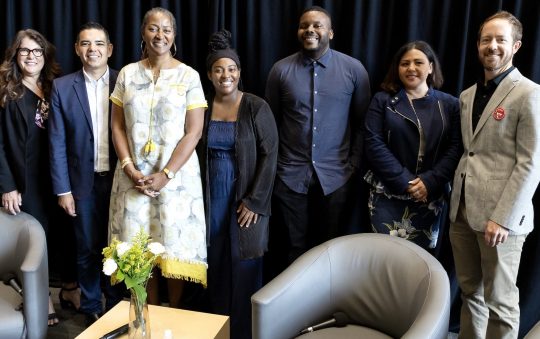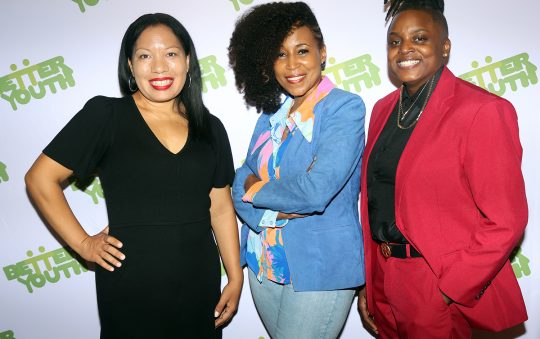
In the sacred memory and honor of the awesome martyrdom, lessons and legacy of Nana Haji Malcom X and out of the ashes and still smoldering fires of the Watts Revolt, we of Us stood up and stepped forward to continue and expand the struggle, keep the faith, hold the line and join in rebuilding the Black Freedom Movement in its Black Power phase, defiantly succeeding its Civil Rights Movement phase.
We joined with those who saw achieving and securing power as the new focus of the Movement. For we realized with others similarly focused that regardless of what issues, problems or challenges we faced, then as now, they are somehow related to the ethics and issues of power.
This includes economic or financial power for a guaranteed income, housing and health care, food security, quality education; political power to control the space we occupy, and to make and share decision-making concerning our lives, our communities, and our futures in real and meaningful ways; and cultural power to define ourselves, represent ourselves and be ourselves without penalty, punishment or oppression in any form.
Haji Malcolm taught that “once you get power you can be yourself, (and) you can create a new society” of real and inclusive freedom, justice and equality. And Nana Mary McLeod Bethune taught as one of her nine legacies “a respect for the uses of power” saying that it must not be abused and used in oppressive and destructive ways, but in ways that “lead to more freedom” and is always “placed on the side of human justice.”
Here the question becomes one of the ethical urgencies of having the conditions and capacities to live a good and meaningful life, and in too many cases, just to live at all. Thus, we saw the disempowering or depriving of people access to power and the conditions and capacities which are both means and expressions of power as a wrong, evil, and injustice we were morally compelled to resist, overcome, and end.
And yet, to speak of the ethics of Black power and the struggle to achieve it requires that we first distinguish it from any similarities or association with White power. This means that we must define and demonstrate it as a liberational process and practice as distinct from White power which in its historical and current forms was and remains a process and practice of oppression, racial, racialized, and racist oppression.
Indeed, White power has historically and currently expressed itself in zero sum ways, refusing to share the common goods of the world, depriving others of their lives and lands, their human rights and resources and assuming a racial and religious right to rule, reorder and ruin the lives of others different and vulnerable.
As we remember and review Us’ 58 years and 232 seasons of culturally grounded and love-driven work, service, struggle, and institution-building, we unavoidably engage and reflect on our place and role in stressing the ethical basis of Black power, economic, political and cultural power, which was at the heart and center of this struggle. Our people’s achieving and securing power became for us the fourth essential goal of the Black Freedom Movement, and borrowing from and building on lessons learned from the liberation struggles around the world, we began to formulate, express, and pursue these shared goals in terms of revolt and revolution and the right to resistance.
And it is here that the issues of the ethics of power and related issues arise and require explanation and discussion. For the abuse of power to oppress has become the commonsense way to understand it and thus defined, power is power over, not power with and power against not power for, power for the good, the right and the possible.
We of Us defined the aims of Black Power as a collective act of struggle to achieve and practice three things: self-determination; self-respect and self-defense. This definition, like many other Kawaida concepts appear in many places with and without proper attribution, whether in articles and books on Black Power or even as the title of a book.
This reaffirms the impact of Us’ practice of building a vanguard organization, helping to build the overarching Movement, programmatically influencing and strengthening other organizations, and providing a new logic and language for our dual liberation struggle to be ourselves and free ourselves. Thus, concepts from “operational unity” and the Nguzo Saba, the Seven Principles, to Maatian ethics and the Seven Cardinal Virtues of Maat find their way in local national and international venues and projects with and without attribution.
Our priority claim to self-determination and the righteous and relentless struggle for it is the priority claim to the natural and human right of freedom. In other words, self-determination is the right and practice of freedom. This means freedom from domination, deprivation and degradation and freedom to develop, realize our potential and aspirations and come into the fullness of ourselves. Self-determination as freedom, requires the practice of controlling the space we occupy, control of our communities in this country and the world African community, and thus, control of our destiny and daily lives. This in turn means the masses of our people having effective participation and representation in every critical social space and in every decision that affects our destiny and daily lives.
For Us, self-respect means having an expansive sense and appreciation of ourselves that is culturally grounded, dignity-affirming and life-enhancing as persons and a people. In other words, it is having and expressing a cultivated and enduring sense and knowledge of the sacredness and sufficiency of our own humanity, this particular soulful, resourceful, resilient, creative, ancient and ongoing, unique way of being human in the world that we call Black and African.
It means also being ourselves without oppression, disguise or erasure and to live our lives in culturally grounded and dignity-affirming, life-enhancing and world-preserving ways. And self-respect means engaging in practices that affirm and honor our identity and dignity as African persons and people and legitimize the life we live, the work we do and the struggle we wage.
For us, self-defense is the right and responsibility to defend ourselves against all forms of systemic and social violence and oppression – police and vigilante violence, as well as economic, political, educational, and other forms of violence and oppression. And we argued, following Haji Malcolm, we have the right to defend ourselves personally and collectively by any means society compels us to take and any sacrifices appropriate to the remedy of the violation of our right to freedom and interrelated goods. Indeed, we saw and see the right to self-defense is not only defense against personal and mob attacks, but also against systems of oppression.
Thus, we taught and teach that in the context of the pathology of oppression, there is no reliable remedy except resistance. Resistance then is the most effective remedy for oppression, for the violation of the human rights to freedom, justice, social equality and to power as a means to achieve and secure these rights. Without the capacity and right to defend our human rights, they become empty claims trotted out in mockery on ceremonious occasions by the very system and persons that violate, pervert, and deny them.
Rising from the aftermath of the martyrdom of Haji Malcolm and the Watts Revolt against police violence, merchant exploitation and systemic racism, our organization Us audaciously asserted itself to aid in bringing into being, defining and sustaining that transformative era and way-opening time called the Black Power Movement. And we have held in unbudging Blackness to its fundamental goals, regardless of the varied falsehoods and forces arrayed against us.
Dr. Maulana Karenga, Professor and Chair of Africana Studies, California State University-Long Beach; Executive Director, African American Cultural Center (Us); Creator of Kwanzaa; and author of Kwanzaa: A Celebration of Family, Community and Culture and Introduction to Black Studies, 4th Edition, www.OfficialKwanzaaWebsite.org; www.MaulanaKarenga.org.







